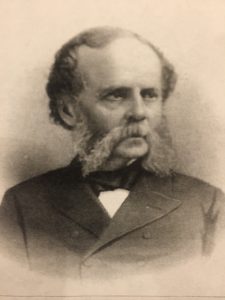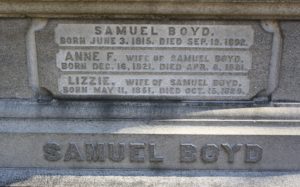
By Brett Peruzzi, Contributing Writer
MARLBOROUGH – Samuel Boyd, a pioneering businessman who dominated civic life for over 50 years, is “the father of the city of Marlborough” according to Bob Kane, curator of the Marlborough Historical Society. Kane has done extensive research into the life and accomplishments of Boyd and delivered lectures on the topic.
“He was always thinking of ways to make the city better,” asserted Kane.
The early years of shoe manufacturing
Born in 1815, Boyd had a limited formal education; he attended sporadically until he apprenticed at age 14, and spent the next seven years learning the leather tanning business. At the time, Marlborough was a farming town whose major products were cider and brandy.
In 1836, Boyd and his brother Joseph opened the city’s first shoe manufacturing business on Maple Street, something that would change the city forever. In that era there were just individual shoemakers who made shoes at home, one pair at a time.
Within a year, Boyd moved his business to larger quarters on the same street. He also had the idea to have multiple people working on different parts of the shoe simultaneously, to speed up production. In 1841, his brother John joined him as a partner. John invented the shoe die the following year, which was used to cut out the patterns, and provided a more uniform method than cutting leather by hand.
Boyd partnered with Thomas Corey in 1849 and built a new, even larger workshop, with the business now called Boyd & Corey. Three years later, they began making shoes using teams of 12 workers. The business flourished over the next two decades, and in 1871 they built a factory at Howe and Main Street, which became the largest in the country at that time, at 50,000 square feet.
Other significant business ventures
He was involved in many other business ventures besides his shoe factory. Boyd promoted and financed the Agricultural Branch Railroad, which helped goods be brought to and shipped out of Marlborough. He also started the first gas company, and the company that brought water to town from Lake Williams.
Boyd also built the town’s electric streetcar system – which was the second in the entire country. He created it for the benefit of his workers, according to Kane, so they could easily get to work on time, and go home for lunch as well. He was the largest holder of real estate in the town, and also owned a coal business and a machine shop, and built an indoor skating rink, which was later converted to a public meeting hall that would become the first theater in Marlborough.
Generosity to community and its residents
Boyd was widely recognized for his generosity, in addition to his business acumen. He donated land to the town, including Chestnut Hill, a property of about 40 acres. Boyd also paid for the land and some of the construction of the French Protestant church, and paid for the land for Holy Trinity Church. One of his most notable acts of charity occurred during the Civil War.

“Boyd gave money to every Marlborough Civil War soldier with a family,” Kane explained, “to help support them while the soldiers were away fighting.”
Boyd died on September 19, 1892, two years after Marlborough became a city, a change possible due to his dedication to its growth. During his career, the population grew from 1,800 to 13,000 residents. When his funeral was held three days later, all stores and banks, and most other businesses, including his shoe factory, were closed, and the schools only held a morning session. The service was held at his home, a large Italianate mansion situated on 20 acres on Fairmont Hill.
“When the service ended,” said Kane, “about 200 workmen from his factory and the street railway marched two abreast into the room, followed by about 75 ladies from the factory to have a farewell look at their employer.”
“For over half a century, 56 years, Samuel Boyd stayed at home and did his life work, building up his native place, just as he said he would when he started out in 1836,” Kane affirmed. “For this reason he truly can be characterized as the father of our city.”











